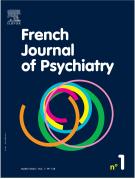Addiction and First Psychotic Episode: how to treat them together ? - 29/05/20
Résumé |
1. Background Most of young adults or adolescents, when there are hospitalized for a first psychotic episode (FEP) has co-occurring addiction disorders.
For the FEP, treating the psychotic trouble is often the first aim, addiction is considered as a second one, caregivers understand substance misuse as a first psychotic trouble consequence [3]. Treatment for FEP can reduced/cessation substance use for half patient [1]. So, there is an underestimation of addiction diagnosis in general psychiatric unit, and lack of integrated specialized addiction care. However, the follow up show that improvement in addictive behaviour is the first step to change the global perception of treatment for psychosis [4].
Adult people with schizophrenia are exposed for abuse, misuse of psychoactiv substance. Prevalence for substance abuse among schizophrenia patients reaches almost 50 % [5]. Without treatment, there is a bad prognostic for psychotic illness but also for addiction trouble. Studies show more relapse in addiction, severe symptoms of psychotic illness and more and longer hospitalisation. These patients present also more emergency admission, increased rate of medical comorbidity, higher prevalence of suicide, Greater rate of unemployement and marginalization [6]. Finally despite the common occurrence between psychotic spectrum illness and substance use disorders, they are often under-recognized and undertreated, leading to poor treatment outcomes [7].
Avoiding this evolution with treatments for addiction and for psychosis is a real challenge for these patients.
2. Method A scientific review was conducted
3. Results and conclusion 50% of patient with FEP, reduce or stop substance use with an Early Intervention only, without specific treatment for addictive behaviour.
Nevertheless, during specific treatment for FEP (Early Intervention Service), there is a need for effective and early intervention for cannabis use because:
– Use of cannabis during the early stage of psychosis is significantly associated with increased severity of psychotic symptoms, mania, depression and poorer psychosocial functioning.
– Continued use of cannabis following the FEP is associated with poorer outcome, on negative and positive psychotic symptoms.
For the FEP with a continued substance use after the onset, recommendations are similar to adults, in order to treat them with specialized integrated interventions.
Le texte complet de cet article est disponible en PDF.Keywords : First psychotic episod, Addiction, Substance use, Severe mental illness
Vol 1 - N° S
P. S134-S135 - novembre 2018 Retour au numéroBienvenue sur EM-consulte, la référence des professionnels de santé.
L’accès au texte intégral de cet article nécessite un abonnement.
Déjà abonné à cette revue ?


